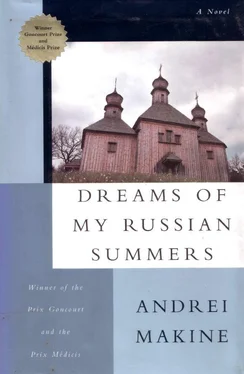Bizarre as it may seem, it was thanks to the local drunkard, Gavrilych, that we were able to gain insight into the meaning of that unusual "strange elsewhere" that our grandmother carried within her. He was a man whose very teetering silhouette, looming up from behind the poplar trees in the courtyard, inspired apprehension. A man who defied the militiamen when he held up the traffic in the main street with his capricious zigzag progress; a man who fulminated against the authorities; and whose thunderous oaths rattled windowpanes and swept the row of babushkas from their bench. Yet this same Gavrilych, when he met my grandmother, would stop, attempt to inhale the vodka fumes on his breath, and articulate with an accentuated respect, "Good day, Sharlota Norbertovna!"
Yes, he was the only person in the courtyard who called her by her French Christian name, albeit slightly Russified. What is more, he had got hold of Charlotte's father's name – no one knew any longer when, or how – and formed the exotic patronymic "Norbertovna," on his lips the pinnacle of courtesy and eagerness to please. His cloudy eyes lit up, his giant's body recovered a relative equilibrium, his head sketched a series of somewhat uncoordinated nods, and he forced his alcohol-soaked tongue to perform this act of verbal acrobatics: "Are you well, Sharlota Norbertovna?"
My grandmother returned his greeting and even exchanged some thoughtful remarks with Gavrilych. On these occasions the courtyard had a very singular appearance: the babushkas, driven away by the tempestuous appearance onstage of the drunkard, took refuge on the steps of the great wooden house that faced our apartment block; the children hid behind the trees; at the windows one could see half-curious, half-frightened faces. And down in the arena our grandmother held conversation with a tamed Gavrilych. Nor was he by any means a fool. He had long since understood that his role went beyond drunkenness and scandal. He felt that he was in some way indispensable to the psychic well-being of the courtyard. Gavrilych had become a character, a type, a curiosity – the spokesman for that unpredictable and capricious fate so dear to Russian hearts. And suddenly there was this Frenchwoman with the calm gaze of her gray eyes, elegant despite the simplicity of her dress, slim, and so different from the women of her generation, the babushkas, whom he had just driven from their perch.
One day, wanting to say something other than a simple "Good morning" to Charlotte, he gave a little cough into his great fist and rumbled, "So that's it, Sharlota Norbertovna, you're all alone here in our steppes…"
It was thanks to this clumsy remark that I found it possible to picture (as up until then I had never done) my grandmother without us, in winter, alone in her room.
In Moscow or Leningrad everything would have turned out otherwise. The motley humanity of the big city would have eclipsed what was different about Charlotte. But she had found herself in this little Saranza, ideal for living out endless days, each like the last. Her past life remained intensely present to her, as if lived only yesterday.
She was Saranza: transfixed at the edge of the steppes in profound astonishment before the boundlessness that opened at its gates. Winding, dusty streets that constantly climbed up hillsides; wooden fences beneath the greenery of gardens. Sun, sleepy vistas. And passersby who, appearing at the end of a street, seemed to be perpetually approaching without ever drawing level with you.
My grandmother's building was situated at the edge of the town in the "Western Glade" district: a coincidence (West Europe- France) that amused us greatly. According to the plan of an ambitious governor, this three-story apartment block, built in the second decade of the century, was intended to inaugurate a whole avenue bearing the imprint of the modern style. Yes, the building was a faint replica of the fashion of the turn of the century. It was as if all the sinuosities, twists, and curves of that architecture had flowed in a stream from its European source and, diluted and partly effaced, had reached the depths of Russia. And in the icy wind of the steppes this flow had become frozen into an apartment block with strange oval bull's-eye windows and ornamental rose stems around the doorways… The enlightened governor's scheme had foundered. The October Revolution put a stop to all these decadent tendencies of bourgeois art. And this building – a narrow segment of the dreamed-of avenue – had remained the only one of its kind. Indeed, after many repairs, it retained only a shadow of its original style. It was in particular the official campaign of struggle against "architectual excesses," which we had witnessed as young children, that had dealt it the death blow. All of it seemed "excessive": workmen had torn off the rose stems, condemned the bull's-eye windows… And, as there are always individuals who want to make a show of their zeal (it is thanks to them that campaigns really succeed), the downstairs neighbor had excelled himself in detaching the most flagrant architectural superfluity from the wall: the faces of two pretty bacchantes, who had exchanged melancholy smiles on each side of our grandmother's balcony To achieve this, he must have performed feats of great daring, standing up on his own windowsill with a long steel tool in his hand. The two faces, one after the other, had come unstuck from the wall and had fallen to the ground. One of them had shattered into a thousand fragments on the asphalt; the other, following a different trajectory, had hurtled into the dense vegetation of the dahlias, which had broken its fall. We had recovered it at dusk and carried it home. Henceforward, during our long summer evenings on the balcony this stone face, with its faded smile and its tender eyes, 'would gaze at us from among the pots of flowers and seem to listen to Charlotte's stories.
On the other side of the courtyard, overhung with the foliage of lime and poplar trees, stood a large two-story wooden house, quite black with age, with little dark, suspicious windows. It was this and its fellows that the governor had wanted to replace with the graceful lightness of the modern style. In this structure, two centuries old, lived the most picturesque of the babushkas, straight out of fairy tales with their thick shawls, their deathly pale faces, their bony, almost blue hands resting on their knees. When we had occasion to enter this dark dwelling, the bitter, heavy, but not totally unpleasant smell that hung in the cluttered corridors always caught in my throat. It was that of the old life, dark and very primitive in the way it welcomed death, birth, love, and grief. A kind of oppressive climate, but filled with a strange vitality, and in any case the only one that would have suited the inhabitants of this enormous izba . The breath of Russia…
Inside it we were astonished by the number and the asymmetry of the doors that opened onto rooms plunged in smoky shadow. I sensed, almost physically, the carnal density of the lives that intermingled here.
Gavrilych lived in the cellar, which three families shared with him. The narrow window of his room was located at ground level, and when spring came, it was obstructed by wild plants. The babushkas, sitting on their bench a few yards away, would cast anxious glances at it from time to time – it was not uncommon to see the broad face of the "scandalizer" between the stems at the open window. His head looked as if it were rising out of the earth. But at these moments of contemplation Gavrilych always remained calm. He would tip his face backwards, as if he wanted to glimpse the sky and the brilliance of the sunset in the branches of the poplar trees… One day, making our way right up to the loft of this great black izba , underneath its roof, warmed by the sun, we pushed open the heavy shutter of a skylight. On the horizon a terrifying fire was setting the steppe ablaze: the smoke was soon going to eclipse the sun…
Читать дальше












